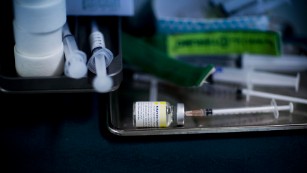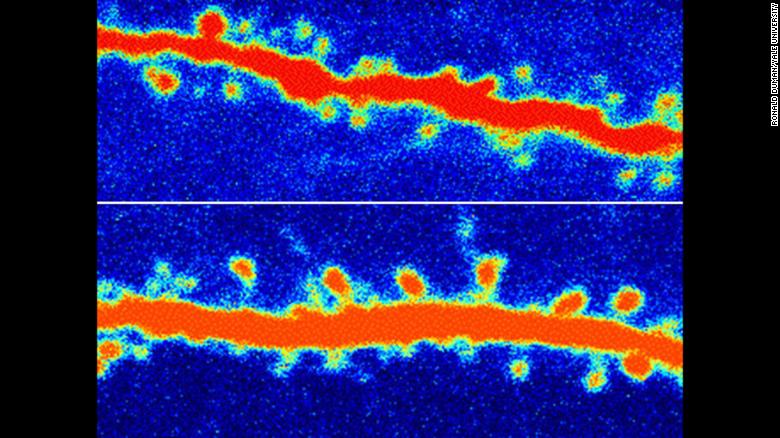Suicidal Ideation
"Ketamine works differently from other antidepressants. The prevailing theory is that it affects the brain's glutamate system, which scientists now realize may be involved in depression, rather than the better-known serotonin pathway used by drugs like Prozac. Animal research suggests that partly blocking certain glutamate receptors increases brain plasticity -- the ability of the brain to make new neuronal connections -- and corrects some of the abnormalities that result from chronic stress. These effects on the brain, coupled with how quickly ketamine works, have inspired a flurry of research. A number of drugs either derived from ketamine, or based on how scientists think it works, are in development."
"But ketamine has what many view as a major flaw. It can produce dissociative and hallucinatory side effects while it is being administered. Patients can feel as if they have left their bodies or that they are dying."
"Questions also remain about the safety of long-term use. Depressed patients often have to return for 'booster' treatments. The drug is considered safe when given once, but no one is sure how repeated doses may affect the brain. And it can be addictive, too."
Moises Velasquez-Manoff, science writer, California
"It makes sense that it [ketamine as a treatment for depression] move up in the treatment algorithm in E.R.s [emergency rooms] and inpatient units [with some caveats relating to addicts falsely claiming suicidal intentions, to be given ketamine to get high; similar to opioids]."
Dr. Michael Grunebaum, psychiatrist, Columbia University, New York

Ketamine's potential as an antidepressant was discovered by researchers at Yale University in the late 1990s. Later, in the mid-2000s, scientists at the United States National Institute of Mental Health confirmed that finding of the efficacy of ketamine in the treatment of depression or suicidal tendencies. Follow-up studies served to confirm the drug can be of immeasurable help in the treatment of people vulnerable to deep depression leading to suicide.
The drug turned out to be an almost perfect candidate to fill a needed treatment gap where conventional drugs and therapies used traditionally failed to help patients; although it may not work for everyone for whom nothing seems to work, its effectiveness is swift, when it does succeed with most who try it. It is a drug already approved by the U.S. Food and Drug Administration, one that treatment physicians are able to prescribe 'off label' which is to say for a use other than the most commonly recognized application for which it originally gained approval.
According to the Centers for Disease Control and Prevention, suicide is now recognized as the tenth leading cause of death in the United States. The prevalence of suicide as an increasingly common cause of death is certainly not confined to the United States; it is a phenomenon that appears to be cropping up elsewhere; in Canada, Europe and other parts of the world, for some inexplicable reason. A growing sense of universal social alienation, a sense of overwhelming isolation, loneliness, social desolation, loss of hope...?
At a time when more people worldwide are being raised out of poverty, where food is more widely available, where opportunities for education are on the rise, and where communication is more accessible and the means of improving one's life growing, it seems peculiar beyond reason that people are becoming more estranged from community life which has always tended to buoy people's spirits; on the other hand, religious conviction which has always been a traditional mainstay in the lives of people and their communities, is waning.
The growing incidence of dark depressing and suicidalthoughts has for some reason not been matched with new discoveries in drug treatments nor workable protocols to help improve peoples' conditions leading to such dissatisfaction with their lives. Selective serotonin reuptake inhibitors of which Prozac is the most famous have been around for three decades in the treatment of depression and suicidal tendencies.
 |
| A rat neuron before, top, and after ketamine treatment. The increased number of orange nodes are restored connections in the rat's brain. |
Ketamine, used successfully as a safe and reliable anaesthetic seems to fit the bill with trials demonstrating that at low doses it is effective in cutting off suicidal thoughts in the psychically affected. Reaction to its use as a deterrent to suicide and lifting of depression is surprisingly swift, a matter of hours from administration of the drug to perceptible relief. But it is a controversial drug in that a number of small studies show that while holding promise there is the unknown of long-term use.
Placebo-controlled trials are being conducted with hundreds of patients. At the same time, ketamine has gained popularity not in the field of practising medicine, but as a club drug. Ketamine abusers have been known to develop symptoms so severe they include brain damage. The hope is that if proven safe and effective in the administration of small, calibrated doses this drug capable of inducing feelings of euphoria may, in strictly controlled protocols entirely transform how the medical community treats depressed patients with suicidal ideation.
Antidepressents used currently work tediously slowly, from weeks to months to begin demonstrating any positive working symptoms; and sometimes after experimenting with them it is discovered they deliver no benefit to specific patients whatever. Such antidepressents may on occasion even increase some patients' suicidal thoughts. As well, therapeutic protocols take agonizingly long to deliver recognizably useful affects.
The safety of long-term use of ketamine, which acts swiftly and positively for most people, is an unknown, particularly since some patients find they require 'booster' treatments, some as frequently as once-monthly, with a drug though considered safe with its initial application may have a cumulative effect if applied frequently -- quite apart from its addictive qualities. Its success as a treatment has inspired the opening of clinics offering ketamine infusions for depression as an off-label treatment.
 |
| Ketamine appears to be a safe and effective drug for use in treating depression -- with some caveats |
Some therapists are concerned that ketamine's unknowns should mitigate against its use before all other options have been explored, including electroconvulsive therapy which has advanced in application and efficacy from its initial uses decades ago. Dr. Samuel Wilkinson, a psychiatrist at Yale who studies ketamine is aware of patients' suicidal impulses returning after successful ketamine treatments in a rebound effect.
Like much in life there is at present a trade-off; use of a drug that may at some future date exhibit seriously deleterious side effects opposite a psychological condition leading to the urge to destroy one's life. Other specialists like psychiatrist Dr. Michael Grunebaum at Columbia University whose study of ketamine convinces him that the drug should be moved up to a first-line treatment urges for its immediate use.
A certain amount of confidence rests in the use of ketamine as an anaesthetic safe and reliable enough to be used on children. "We could help so many people", states Dr. Lowan Stewart, an emergency room doctor in New Mexico who feels ketamine should be the drug of choice in emergency rooms where doctors could offer it to suicidal patients.
Labels: Bioscience, Depression, Drugs, Research, Suicide, Treatment

0 Comments:
Post a Comment
<< Home